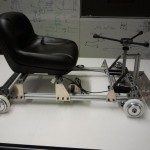The Other 2.007: Electric Vehicles, Not Robots [Video]
-
-
slice.mit.edu
Filed Under
Recommended

Charles Guan '11, a grad student in mechanical engineering, taught this special 2.007 EV section, which students affectionately named 2.00gokart.
Guan has made a name for himself lately on the Interwebs for video of his own three-week CAD-to-completion project, Chibikart, an "ultra-small four-hub motor drive go-kart designed to test out the ability of the 100mm size hub motors to move a person without assistance," according to Guan's blog, Equals Zero. Chibikart exceeded his expectations in efficiency and power use at speed, even when climbing the parking-garage course. It's also his first use of 80/20 slotted framing which is very popular for prototyping machines quickly. Read his entries about building the machine, and watch it in action in the video below.
As for the 2.007 section Guan taught, he details the semester and the student projects on his blog. A123Systems donated batteries. Here are the rules, as Charles posts on his website. Read through his post for his analysis of what he'd do differently next time:
"You had to use 1 to 3 of the A123 12V7 bricks in your design, or else if you do want a custom battery solution a charger must be included in the budget. You got one 8″ pneumatic tire for free, choice between one with a sprocket, one with a belt pulley, and a 'front' wheel i.e. no attached drive parts. You didn’t have to use it—this was a last minute pre-term rule change, because I was about to make everyone use an 8″ drive wheel. This was to encourage some more diversity in design…and in the end, I’m glad it happened. There were just some seriously creative efforts that would have been hampered by a wheel requirement. Major components, including motor, controller, frame materials, power transmission components, and any other vital parts (such as the deck, for the only skateboard-style project) must be under $300 not including shipping costs. Hardware and some small incidental metal stock was [sic] not included."The drag race was held in a relatively smoothly paved back alley under the Brain & Cognitive Sciences complex. Securing a parking garage for the hill climb was more challenging. But Guan and others convinced campus officials they had taken appropriate safety precautions for the narrow turns at the ends of the garage—by setting up literal safety nets—and MIT Parking and MIT Police closed off an entire parking facility on a Sunday for the event.
Check out the highlight footage below. Scooters averaged 9 to 11 seconds, and Melonkart hit an 8.28 second run. Instructors also got in on the fun. Chibikart managed an 8.26 second run. "The cool part about it," say Guan on his blog, "is now that there exists an official activity safety process for this kind of event, we could throw a go-kart race almost whenever."







